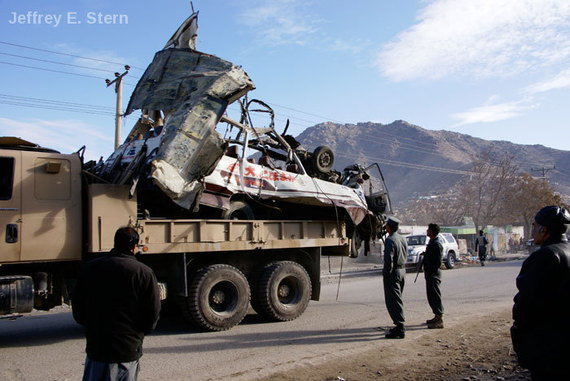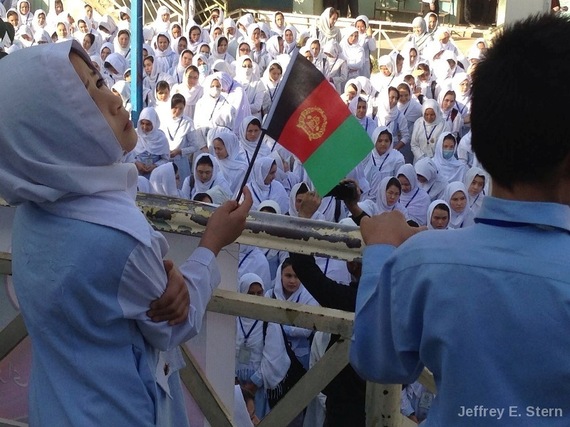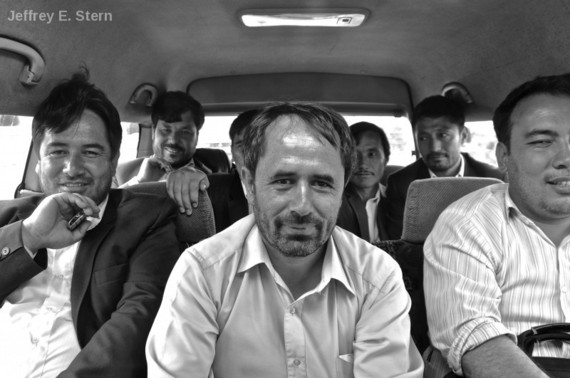There was a child we will call Meena. She lived in Pakistan. She was a child of energy and initiative. She was six years old when she attempted her first terrorist attack.
She hated India but wasn't sure why, just knew that her uncles watched India testing bombs on the news and grumbled about how India hated Muslims. She also knew that men didn't do anything but sit and drink tea and complain. Girls had to take matters into their own hands. So she taped little firecrackers to a toy helicopter and launched it from her roof. She didn't really know which direction India was, come to think of it, or how the toy would find its way there. Anyway it lifted three feet in the air and then the firecrackers went off and covered her in ash.
As she got older the violence around her became real. It came not from India, but from a new group--the Army of Jhangvi - that was hell bent on destroying people who looked like her. You see, Meena was a different kind of Muslim. She belonged to one sect (Shia) in a country that was mostly another (Sunni). She belonged to an ethnicity (Hazara) so she looked kind of East Asian; most people around didn't. And she was not from this place, she was from Afghanistan, she was living in Pakistan as a refugee. All these categories seemed stupid to her because how could you fit a person into such small boxes? But they made her guilty by association of many things. Of being spy for other countries run by people who were Shia. Of being a stain on the face of a proud nation, and a draw on its resources. Most frustratingly, of apostasy. Her people were called un-Islamic.
So the Army of Jhangvi started to target her people. Bombs went off in markets where people who looked like her shopped. The government, like her uncles, did nothing, while many of her people were destroyed.
Again, she decided to take matters into her own hands. As she couldn't get to those who killed her people--infuriatingly, they attacked and then disappeared-- the best she could do was terrorize people like them. They belong to an ethnic group called Pashtun, so she decided she would terrorize any Pashtuns she could find.
She plotted to stone a teacher in the middle of a big field so people could see his mutilated body, but her plot was interrupted. She had Pashtun neighbors who adored her for her wit, so she turned it on them and made fun of them mercilessly, then went searching her house for a gun.
She dreamt of joining the Taliban, maybe al-Qaeda, of earning their trust, and then turning on them. Bombs went off in front of her, and she saw strangers her age ripped apart. Then her best friend was killed by a bent piece of metal flying from an explosion. She learned that the way you influenced other people and protected your own was by sending shrapnel through civilians.
She was wild with violence. She was extraordinarily smart. She did not have access to very good schools as a refugee, but she had drive. The uncles who watched TV all day decided she needed to get out of this place. They would send her "home," to Afghanistan, where she was from, but where she'd never been. They heard of a school there, which had sprung up in the unlikeliest of places, a desert slum in the capitol. Perhaps it would let her in.
*
It was called Marefat, and at Marefat, some magic happened. In class, students talked back. It wasn't about memorizing data and reciting it to the teacher. Obedience was rejected. Reverence was rejected. There was a student parliament so kids could practice being democrats, and one day every semester the teachers had to stand up to the criticisms of the student body. No one could tell anyone else what to do or believe unless they could explain why.
The headmaster recognized this student from the thousands of others. He saw the violence in her eyes. He noticed the particular way she channeled tragedy. He'd done it too. He'd been a holy warrior, he'd left school in fifth grade and became a child soldier. He'd seen massacres and felt the same rage claw at his brain that he could see was clawing at hers. But in this school he had built, she was given a place where the rage could come out in essays and rhetoric, in plays and in paintings of massacres
There was a library with books about all the things she wanted to know, in all the languages she wanted to learn. There were many outlets for expression: a radio station, a photography program, an art class. A gallery where students displayed and even sold their work, a million things to do, a million ways to be productive, to forestall the sense of futility a girl, a minority, a person without much opportunity was always on the verge of feeling--that sense that the only way to change your environment was to destroy a part of it. Here, even a girl, even a refugee, could see her impact on the world.
She seethed still, but the temperature in her dropped. Meena decided she wanted to be a doctor. So she could help people hurt by bombs. And, occasionally, poison people who annoyed her.
***
Now she knows she's smart. She knows, from classmates, that girls can go to good schools, get scholarships to foreign countries, get good jobs. That some people welcome her crazy ideas, don't mind helping her express them in essays and poems instead of telling her to help her mom in the kitchen. At Marefat she's seen proof that oppressed people can win things for themselves without weapons.
But around her the country is threatening to collapse back into the era when violence was normal, a thing you walked passed on the way to work like a familiar storefront. She's distracted; her people are getting massacred again. American troops are mostly gone, a few thousand of them remain but they're busy training the local army and occasionally going out on counterterrorism operations. They're not protecting people like Meena, her classmates, and the headmaster of her school. Now ISIS is in Afghanistan. And the Taliban has re-taken entire cities. Class size is shrinking because her classmates are disappearing, crossing borders to flee rising violence, pushed away by a shriveling economy.
At Marefat, the headmaster keeps going, holding demonstrations so his people can speak out about the violence happening to them, and so that they might demonstrate to themselves that nonviolence can still be an option.
But he is barely holding on. And the girl in his halls who aspired to be a terrorist is too.



